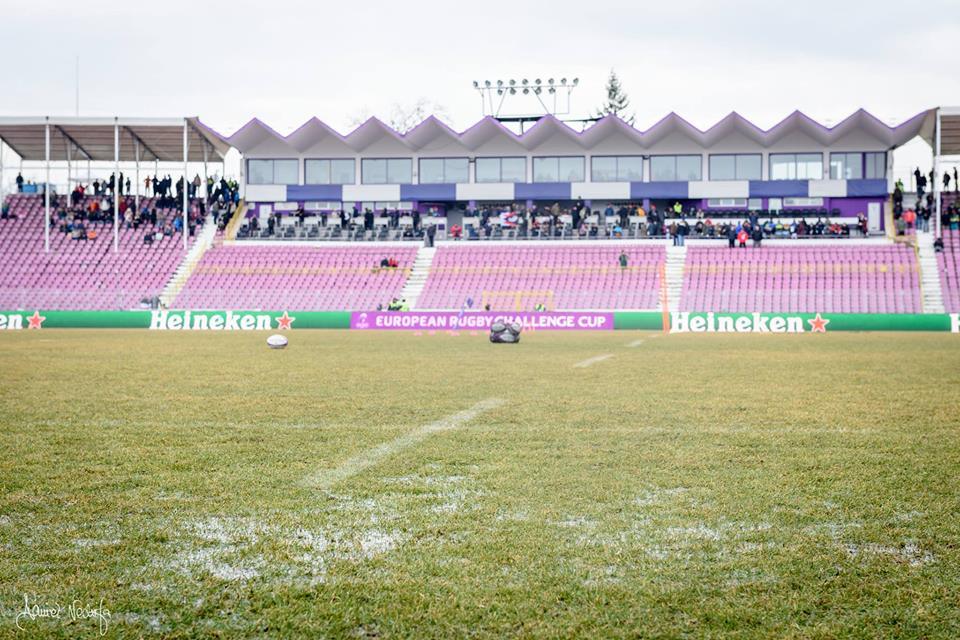Saturday 14th January 2017 should have been a big day for Romanian club rugby. Stade Francais, champions of France in 2015, were coming to Timișoara to play a European Challenge Cup game. The hosts, Timișoara Saracens, are the best (and richest) team in the Romanian game: champions three out of the last four years. The 36-man squad for the national team, announced last week for the forthcoming Rugby Europe Championship fixtures, includes no fewer than sixteen Timișoara Saracens players.
Having qualified for the group stage of the competition by beating Calvisano home and away, the Romanian side struggled badly against the far superior opposition presented by Harlequins, Edinburgh and Stade (away). French teams have often been known for not travelling well and for not taking certain competitions seriously, and in temperatures well below zero on a difficult surface, after several days of snow, a tight-knit, powerful Romanian pack might be expected to cause problems for a second-string Parisian team. This was to be a golden opportunity for the home side to get some points on the board.
Two days before the match, Druckeria.ro, a local sports supporters’ website in Timișoara, posted the below photograph of the pitch at the Dan Păltinișanu stadium, suggesting that the game was in doubt.

Officials at the club seemed unperturbed. But when Saturday came, although the snow had been removed, the surface was borderline unplayable. Incredibly, however, the match was not called off until after the kickoff time of 2pm: see this article on Planet Rugby for the full story.
The upshot of the cancellation is that Timișoara Saracens have been fined €30,000 and, without having to make a tackle, let alone launch an attack in search of a fourth try, Stade have been awarded the match 28-0 with a bonus point. As discussed in the Planet Rugby article above, some in the game have accused the authorities of dealing too harshly with the Romanian club and of letting the French off too lightly: the referee had decided on the morning of the game that it would go ahead, but Stade refused to take the field.

A friend of mine was there as a spectator and inspected the pitch himself; he agreed the match should not have taken place. It is very easy to blame the French for the stereotypical vice of “not fancying it”, and it was noticeable how quick some non-French rugby fans were to believe a conspiracy theory about the real reasons for the match not taking place. When the Timișoara club requested to play all their European home games before Christmas, anticipating harsh winter conditions, Stade were the only opponent to refuse: so some ill-feeling may be hanging over in the region from that episode.
But a well-argued piece (in Romanian) by Gabriel Toth on the Druckeria website lays the blame squarely with the local authorities in Timișoara, for having neglected its sporting infrastructure for years, and by extension with Romanian sporting governance for lax observance of its own rules. The rugby club does not own the Dan Păltinișanu stadium: the ground is rented from the local council for each match. The regular tenants, top-division football club ACS Poli Timișoara, were responsible for undersoil heating being installed a year earlier; but because they could not afford to pay the full cost (and that’s another story…) the heating system was never connected to an electricity supply. By the time rugby club officials were able to gain access to the stadium and hook up the power using a seven-tonne generator which they hired at a cost of ten thousand euros, it was too late to thaw and dry the pitch sufficiently for a professional game of rugby to take place. An embarrassing situation which could have been avoided if the national football league administrators had actually paid attention to the situation and denied the club a licence for Liga 1 on the grounds that the undersoil heating was not, and never had been, functional and thus the club was in breach of its regulations.
And that’s not all. In November Timișoara’s men’s handball team were one match away from qualifying for the group stage of the EHF Cup, a continent-wide competition. They lost narrowly to RD Ribnica of Slovenia in the third round. If they had made it through, the Timișoreans would not have been able to stage matches at their home court because it does not meet EHF requirements.

For this concatenation of sporting shortcomings, Toth blames “incompetence, disinterest, bureaucracy and lack of initiative”. Sadly, of course, such things are by no means limited to one city. The stadium of CFR Cluj, another Liga 1 club, does have working undersoil heating, but their December 2016 home match against (coincidentally) ACS Poli Timișoara was played on a semi-frozen pitch because the hosts could not afford to turn it on. Other financial and administrative woes are catalogued extensively elsewhere in these pages: just click on the “shambles” tag.
Fans of the London rugby club Harlequins, who enjoyed a successful visit to the city just before Christmas, read about the fine imposed on Timișoara Saracens and set up a fundraising account to help the club. At the time of writing over £1500 has been donated. It is heartening to see that some supporters care enough about the game to pay out of their own pocket to help a club in a less developed rugby nation. If only the authorities who are tasked with supporting and promoting the game in their own localities considered it so important.
UPDATE: Stade’s next home game after the Timișoara trip was against Harlequins. The pitch was partly frozen, which delayed kick off by an hour. Was the French club sanctioned? What do you think? Read a piece on it from Sporting Sermon here.





Leave a comment